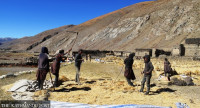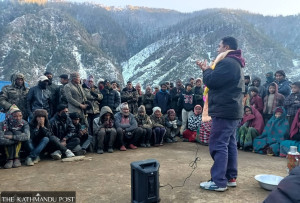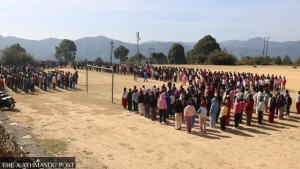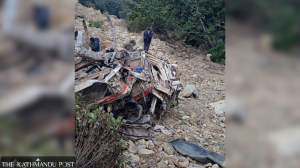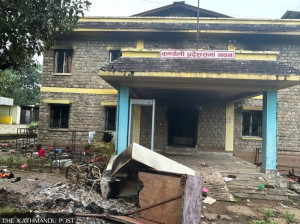Karnali Province
Local government rule requiring its permission to marry draws flak
Kapurkot defends new rule enforced to tackle underage marriages and teen pregnancies.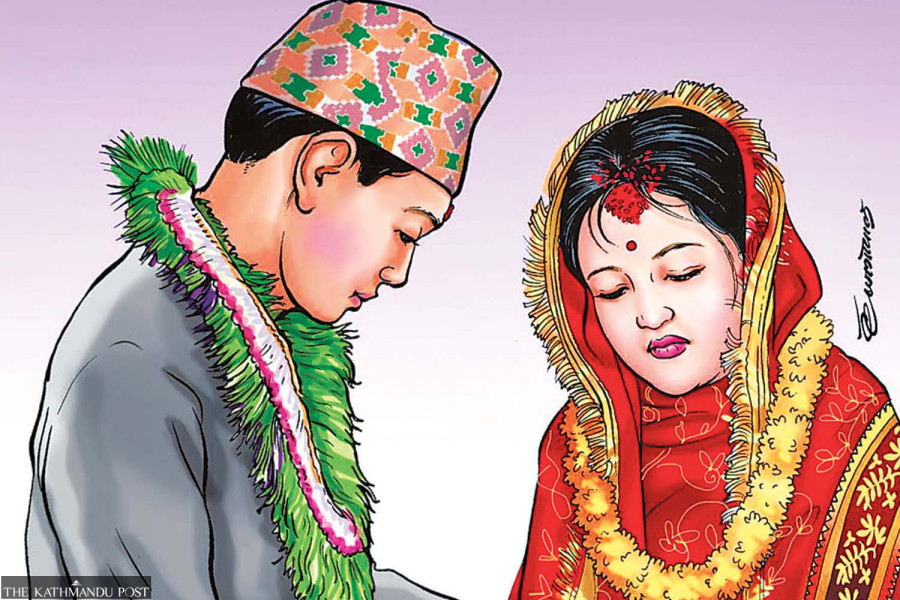
Biplab Maharjan
Kapurkot Rural Municipality in Salyan has made recommendations from the ward offices mandatory for individuals planning to get married. The injudicious declaration by the local unit has drawn ridicule from some quarters of society while others have supported it.
The rural municipality is plagued by child marriage and its repercussions and despite several targetted campaigns to end the malpractice, the social evil persists.
When all else failed, the rural municipality decided to take the unusual and apparently unconstitutional step to combat child marriage. Individuals of all ages seeking to marry must secure recommendations from the ward offices concerned, says Durga Bahadur Pun, chairman of the rural municipality.
The rule for the mandatory recommendation was passed by the 11th assembly of the rural municipality in mid-January.
“We conducted and are still conducting several campaigns to combat the malpractice, but child marriages have not stopped,” said Pun. “The new rule requiring approval from respective ward offices has been introduced so that parents and guardians would not marry off their children before they reach the legal age.”
Although the intention of the local unit officials may seem noble, the lack of homework and thorough understanding of the law on their part has raised several questions.
Tilak Sharma, 38, a resident of the rural municipality, says the mandate extended even to adults who are already past the legal age of consent infringes on their fundamental rights. He thinks those engaging in the malpractice would not approach the ward offices for recommendations, making the rule ineffective.
“The rural municipality may be taking a moral stand, but I don’t think they put much thought into it,” said Sharma. “Two adults who have reached the age of consent should not be needing anyone's permission to get married.”
Child marriage was banned in the country in 1963, but the practice is still rampant, especially in the rural areas.
As per the Civil Code Act 2017, the legal age of marriage for both women and men in Nepal is 20 years. As per Section 173 of the Criminal Code, a person found guilty of either engaging in or arranging underage marriage faces up to three years’ jail and Rs30,000 fine.
There are 10 local units—three municipalities and seven rural municipalities—in Salyan. To discourage child marriage, other local units have been conducting various awareness programmes in partnership with the police.
The Kapurkot Rural Municipality has also been organising various awareness programmes such as ‘child marriage-free schools’ campaign this fiscal year especially targeting schools.
The rural municipality’s latest move has been criticised by legal experts and human rights advocates who say that despite the local unit’s good intentions, it is a violation of Nepal’s law and citizen’s constitutional right to get married freely after reaching the age of 20.
Pun, chairman of the rural municipality, defends his decision saying that the move does not contradict the constitution and is purely aimed at curbing child marriage.
To get the recommendation from the ward office, the prospective bride and the groom need to submit their birth certificates at the ward office after which the ward issues a recommendation letter free of charge.
Pun, pointing out the number of underage pregnant girls, said that past efforts by local units have failed to discourage child marriages.
“This fiscal year, among the 120 pregnant women who came for their first pregnancy test at different health institutions of the rural municipality, 35 were under the age of 20,” said Pun, “Even though many awareness programmes have been conducted in the past, the number of people getting married at the age of 15-16 has not decreased.”
Lawyer Chandra Prakash Oli says the rural municipality’s move is unlawful and therefore must be scrapped.
“Two adults do not even need the consent of their parents to get married. The municipality cannot force anyone to seek permission for marriage,” said Oli. “The rule is an infringement of the fundamental right of an individual.”
Questioning the effectiveness of the move, Oli says the rule will not bring the child marriage numbers in the rural municipality down as expected by authorities since underage couples eloping to get married outnumber arranged marriages involving underage children.
“The rule itself will not be effective because even if someone gets married without acquiring recommendation, the rural municipality cannot take any action,” said Oli.
Meanwhile, Bharat Kumar Oli, the chief administrative officer of the rural municipality, defending the new rule said that it will dissuade parents from marrying off their underage children and will not infringe upon the rights of adults to get married freely.
“Child marriages are still prevalent in the region due to the lack of awareness among parents, so the new requirement will stop them from continuing the practice,” said Bharat Kumar.
Completely amiss of rights infringement, Bharat Kumar says anyone aged 20 years and above will not have issues receiving the recommendation from ward offices. “This is a campaign started to reduce child marriage and it will not affect anyone’s human rights,” he said.
Bharat Kumar emphasises the disadvantages of child marriage far outweigh the cost of fundamental rights infringement. “This move will help us control gender-based violence, teen pregnancies and poor maternal and infant health,” he said. “Lots of women in rural areas die at a young age due to complications in pregnancy caused by early marriage.”
Human rights activist Ramchandra Regmi says the rural municipality cannot violate the constitutionally-guaranteed rights of an individual by foisting the new rule on local units.
Regmi said that since the decision made by the municipality goes against the law, it must be revoked.
“Child marriage and teen pregnancies are concerning issues but there are several other ways to fight them,” said Regmi. “Local bodies have no business interfering with an adult’s personal decision. This goes to show how out of sync our people’s representatives are with the rule of law.”
Regmi says people’s representatives should exercise caution; conduct thorough research and seek a deeper understanding of the law before introducing rules that affect the public since what may seem like minor transgressions stand to have a huge impact on human rights.




 17.12°C Kathmandu
17.12°C Kathmandu





